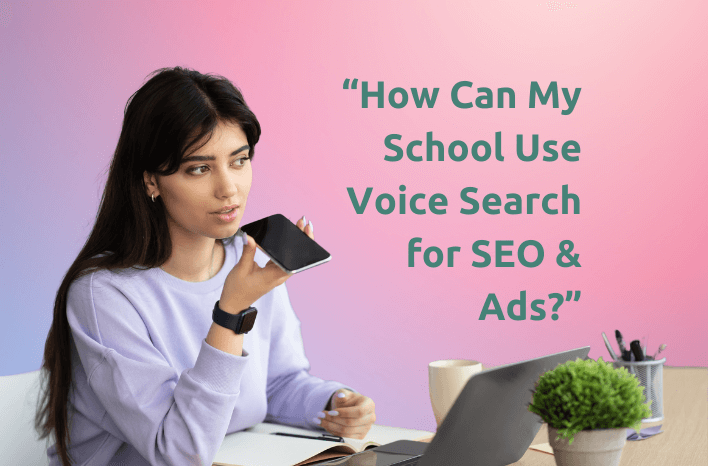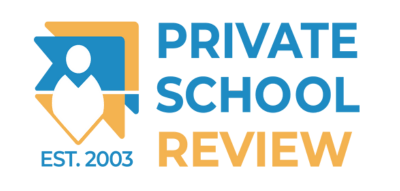by Lael Kittle, Lead SEO Specialist, Truth Tree
Voice search has become an integral part of the modern parent experience. This blog explores the significance of voice search for private schools in their advertising and search engine optimization (SEO) strategies. We’ll cover its growing popularity and share how to harness it for better results.
Lael Kittle, Lead SEO Marketing Specialist
Truth Tree
“Voice search is not merely a trend. It’s a force marketers should be using.“
What is a voice search?
A voice search is any search someone makes when speaking to virtual assistants like Siri, Google, Cortana, Alexa, etc.
Someone might, for example, ask their phone, “When is the next Taylor Swift album coming out?”
The alternative to voice searching that question is typing it into a search engine. The average person has a typing speed of 40 words per minute which means it would take most people 13.5 seconds to type out. Over time, we’ve learned to type fewer words to shave away seconds. Instead, they might type “New Taylor Swift album”.
Typically, most advertising agencies target the typed keywords (and not voice search keywords) since that search behavior has existed since the first search engine.
So why does voice search matter?
- There are over 1 billion voice searches every month.
- Having the full voice search phrase or question as a keyword gives you a better chance at the ad displaying and/or a higher SEO rank than a shorter keyword.
- Most website makers/advertisers are not utilizing it.
- If you’re already running ads, it’s free! The ads are already running; you’re increasing your keywords to reach more parents.
How Do I Determine Which Voice Search Keywords to Target?
First, start by understanding how users are searching for a school via typed keywords. There are several ways you can find this information. The easiest is starting a search on Google. It will provide suggestions for similar searches or content being searched for by similar audiences.
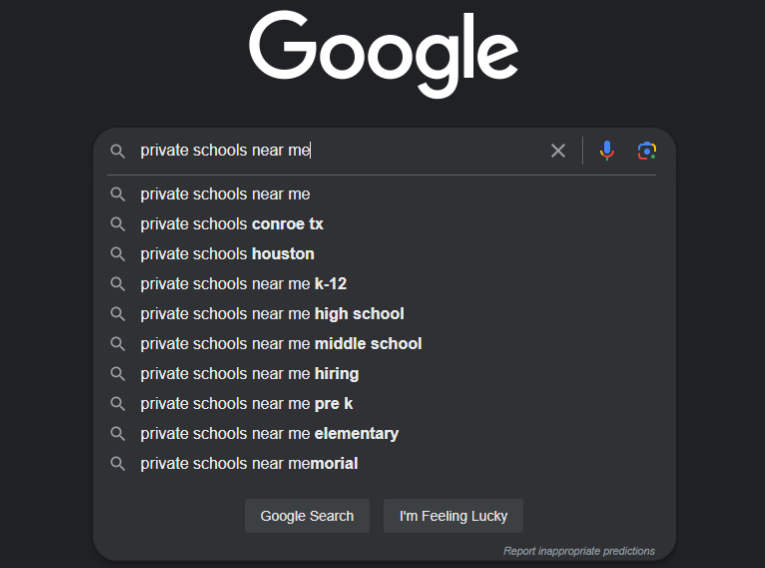
If the search is a question, Google will populate a “People also ask” section. This will show more long-form search terms that someone would be more likely to use in voice searches.
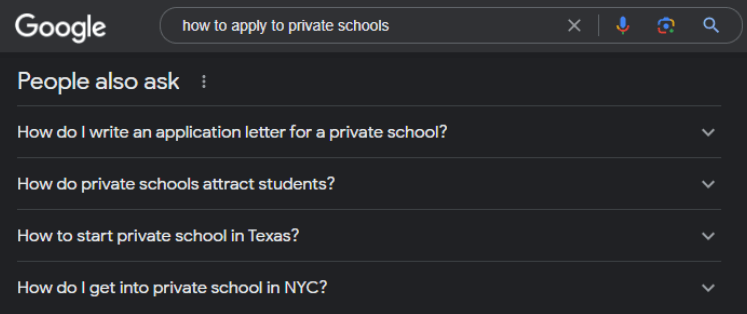
Brainstorm and ask yourself what you would verbally search to find a school.
- Private schools located in [your city]
- What private schools are near me?
- What private schools are around me?
- What private middle schools are in the area?
- How to register for a private school tour?
- How do I apply for a private school?
- What are the benefits of a private school?
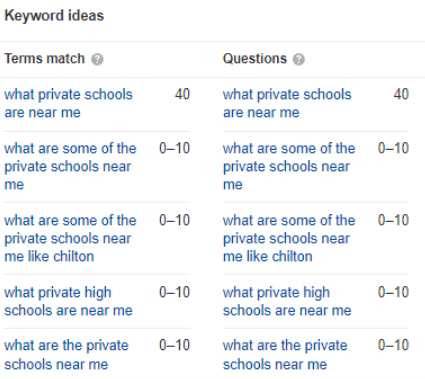
Another way to determine search terms is to use a keyword research engine, such as Ahrefs or SEMrush. You can enter any search term that will provide similar keywords or phrases, including any long-form keywords. While these services are paid, some allow a single website and a limited number of keywords to be analyzed for free.
How does voice search work for Google ads?
Easy: Throw the voice search terms into your keywords. You can pause or remove them if they perform poorly. Google ads track keyword performance incredibly well, making it easy to see if the keyword is worth keeping.
How does voice search work for SEO?
Due to the strict character limit of titles/meta descriptions/alt text, etc., you want the keywords you target to be the most optimized and highest searched.
You don’t want to put “How to get into a private school in Houston, Texas” as a keyword due to its length in your limited space. However, if that is a common search, the keyword “Private school in Houston, Texas,” is a great one to target instead.
Using a service such as Ahrefs or SEMrush will give you an estimated volume on these keywords, giving you another valuable tool to get the right keywords.
So, do voice searches not matter for SEO?
The exact opposite! However, instead of trying to fit common voice search phrases into your titles, meta descriptions, and alt text, you want to work them into the content on the page.
With any Google search, you’re likely to find many “how to” pages linked in the results. Why? Because that is what people search for, especially with voice searches. You’ll see the phrase “how to” repeated on most, if not all, of those pages.
You want to ensure the content on your page has written text that matches what a searching parent might ask their phone or virtual assistant. Even a few long-form keywords on the front page flag Google that “our website answers the question people are asking.”
Still trying to figure out what to use? Follow the age-old questions:
- Who?
- What?
- When?
- Where?
- Why?
Examples:
- Who is the best Catholic school near me?
- What are the benefits of a private school education?
- When are private school open houses?
- Where is the best private school near me?
- Why are private schools better than public schools?
- How to get my kid into private school
- How can I afford private school? <- if you have financial aid or are promoting scholarships.
- Are there public school alternatives near me?
- What is an Episcopal school?
- What private schools are still accepting 2024 applications?
- How to apply for private school scholarships
- Find the closest private school to me.
- Where can I view nearby private schools?
Note: Not everyone uses voice search!
Schools each have unique audiences, and some are more prone to use voice for a search than others. While some long keywords may work for some schools, others may not.
It would be similar to how some display placements work well for some schools but not others. Different audiences need different targeting.
Millennials are currently the most likely to use voice searches, so schools that serve students in PreK-8th grade would have the most benefit from this expansion.
So, should I delete short keywords?
Absolutely not! Short keywords will always be the most important since they can bid on typed and voice searches. The advantage of having the entire question as a long keyword can help boost that ad and/or SEO ranking to more prospective parents.
Voice search is not merely a trend. It’s a force marketers should be using. While short keywords remain fundamental, integrating voice search queries into advertising and SEO strategies enhances visibility and caters to evolving user preferences.
How Optimized is your School’s Website?
Do you have questions about your school’s SEO? Are you feeling lost about keywords in general? Would having a team of digital marketing experts help your school reach more parents? Let’s get started.
